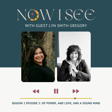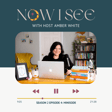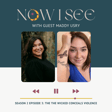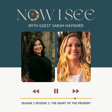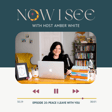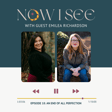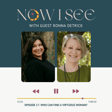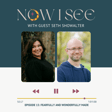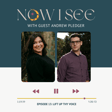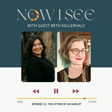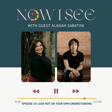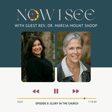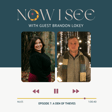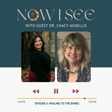Become a Creator today!Start creating today - Share your story with the world!
Start for free
00:00:00
00:00:01

Season 2 Episode 1: I Will Come Again
Now I See is back for Season 2!
Today, I'm talking with Julia Postema and Jeremiah Gibson. They are the co-hosts of the podcast Sexvangelicals: The Sex Education the Church Didn't Want You to Have. They are both Boston-based licensed psychotherapists and certified sex therapists who work with clients in Massachusetts. They currently live in Utrecht, The Netherlands. They specialize in helping couples with negative religious backgrounds discover sexuality that works for their partnership.
Tune in for a thoughtful conversation about their experiences as former faithfuls turned sex therapists working with people who are discovering (or rediscovering) their sexuality after painful religious experiences.
More About Julia + Jeremiah:
Links
Transcript
Introduction to 'Now I See' Podcast
00:00:01
Speaker
I was lost in utter darkness I was trapped in toxic shame I was bound by my religion Till I chose to break away
00:00:24
Speaker
Now I'm finding my true colors For the first time I feel free Now I'm learning self compassion And as I heal I'm finding peace
00:00:51
Speaker
Welcome to Now I See, eye-opening stories from the formerly faithful. I'm your host, Amber White, and here, me and my guests share our experiences in loving and leaving rigid faith systems. Together, we shine a light on the dark corners of these institutions and share the joys of rebuilding life on our own terms. I promise you'll leave inspired, even if you are a little teary-eyed.
Season 2 Overview and Solo Episodes
00:01:24
Speaker
Hi, and welcome back to Now I See. I'm your host, Amber White, and I am back for season two, folks. Season one was a whirlwind in the best way. And after a much needed winter break, I am excited to be back and bringing you more stories from some remarkable people.
00:01:47
Speaker
This season will be a little shorter than last season. We'll have 14 episodes ending at the end of September instead of the end of December. Running this show takes a lot of planning, time, and energy, and my life just can't support 20 episodes that run through the holidays this year. But I hope to be able to do more again in future years.
00:02:13
Speaker
I'm also going to be doing shorter introductions with a few solo episodes sprinkled in, so you'll be hearing from me a little more in between guest episodes. If there are particular topics you'd like to hear discussed on the show or you'd like for me to talk about, I would love to hear from you. You can still contact me directly on the Now I See Pod website at nowicpod.com.
00:02:41
Speaker
And I do hope you reach out because I truly love hearing from you. So many of you reached out in season one to share your stories with me and to tell me what some of the episodes meant to you. And it was a beautiful, beautiful experience for me. And season one changed my life. So I appreciate it. And I look forward to hearing from you this season as well.
Introduction of 'Sex Vangelicals' Hosts
00:03:07
Speaker
I decided to make kicking off on Easter Sunday extra spicy this year. So today we're talking with Julia Postema and Jeremiah Gibson. They are the co-host of the podcast Sex Vangelicals, the sex education the church didn't want you to have. They are both Boston-based licensed psychotherapist and certified sex therapist who work with clients in Massachusetts.
00:03:34
Speaker
They currently live in the Netherlands and specialize in helping couples with negative religious backgrounds discover sexuality that works for their partnership. They enjoy traveling to places that tend to fly under the radar, long distance hiking, cooking very spicy food, unexpected conversations, and introverted days filled with reading and drinking fancy tea. I can relate to that.
00:04:00
Speaker
Together, we talk about each of their former faithful experiences and what they've learned from the work they do. They also share some of their favorite tools that they use with their clients and let us know what they're up to next. And it's pretty good stuff.
00:04:17
Speaker
The book they mention in this episode is available in the bookshop, along with several other books that delve into the effects of purity culture. I have that linked in the show notes, along with Julie and Jeremiah's social media profiles and the ways that you can keep up with them. As always, I thank you so much for being part of this journey, and I hope you enjoy listening to this episode as much as I enjoyed recording it.
00:04:45
Speaker
All right, let's get into the episode. Hi, Julianne Jeremiah. I am really excited to have you on the episode today. The first one of season two, Easter Sunday. It's very exciting. Yes, happy Easter, Amber.
00:05:13
Speaker
I love that I'm having sex evangelicals on Easter Sunday. It just feels like such a wonderful, perfect way to welcome things back from the bridge. Like talking about sex with two sex therapists. I know, right? It's pretty perfect. Everybody's being reawakened today. Sure.
Journey from Evangelicalism to Sex Therapy
00:05:36
Speaker
Well, I would love for you to tell the listeners a little bit about your backgrounds and like, how did you come to be sex therapists as a couple? And tell us a little bit about the work that you're doing.
00:05:49
Speaker
Okay. Well, our podcast is called Sex Evangelicals. The podcast about the sex education the church didn't want you to have. Jeremiah and I both grew up in different versions of an evangelical space, and what we learned about gender, relationships, and sexuality were deeply harmful to us.
00:06:13
Speaker
Ultimately, I and Jeremiah can share his own story later, followed all the dictates of purity culture, which was quite damaging to my marriage at the very mature age of 22 years old. I am divorced and the divorce occurred in large part due to how
00:06:37
Speaker
messaging from fundamental religious spaces set me up to fail in my sexuality and ultimately in my marriage. I tell folks that I went to sex therapy before I became a sex therapist. And sex therapy for me is an opportunity to support folks of all backgrounds, but especially folks who grew up with
00:07:04
Speaker
poor negative or no sex education to relearn scripts not based on our god given genitalia not based on performative relationship structures but based on pleasure based on consent and based on the values that each person each partnership or other relational structure might have.
00:07:28
Speaker
I love that. I'm struck by how each of those things you just mentioned in your list comes from a deep knowing of self and not performing for another person. You have to know yourself and what you love to have any of those things and to have that kind of connection. I just think that's really beautiful. Yeah, definitely. And Julia, I would add to that.
00:07:51
Speaker
So Julia and I are both psychotherapists. We're both licensed in Massachusetts. We're in the process of opening a coaching and retreat center called Let's Heal Together. And we started off as relationship therapists, as family therapists, both of us. And we both got into sex therapy in different ways. I think, Julia, you actually got into it a little bit more intentionally than I did. I kind of stumbled into sex therapy. My boss at the private practice I worked with
00:08:20
Speaker
I said, hey, Jeremiah, I know you're really into couples therapy. I think it'll be important for you to have a specialty. I'm starting a sex therapy training program. Do you want to be a part of it? I will subsidize it. I'm like, oh, okay, sure, fine. That sounds great. So I join first class. There's six of us. And the first class is about sexual ethics. And part of sexual ethics is thinking about sexual health and thinking about what are sexual health principles.
00:08:49
Speaker
And we can talk more about the other five sexual health principles that we start with in a minute. But the first one is consent. And we talk about consent. We talk about sex being a collaboration. We talk about being a conversation and negotiation. And I left the class thinking, oh, shit.
00:09:07
Speaker
because I had been in a relationship at that stage, a marriage at that stage for about nine or 10 years myself. I got married at 24, but had also dated the same woman throughout a Christian college experience. So our relationship, our sexual experiences, very
00:09:27
Speaker
influenced and harmed by sexual dynamics dictated by peer-to-culture. And part of that over time became like in order to have sexual experiences for both of us, the anxiety was so high because our initial sexual experiences had panic attacks that were attached to them that over time we stopped talking openly about sex. That just kind of happened.
00:09:55
Speaker
and leaving that class and thinking, oh my goodness, one, I've been doing it wrong and I've been trained to do things right. So I had that variation of an existential crisis. But then also realizing I've been harming my partner in this process. And that was a really key moment for me in
00:10:17
Speaker
expediting the process out of religious communities for me. I tried to talk about that with my partner. Unfortunately, long story short, the relationship was
00:10:31
Speaker
had had damages to it that were unable to be tended to, ended up getting divorced as well. But the more that I've studied sexuality, met Julia, we've studied sexuality together, we've realized that
00:10:48
Speaker
Our work really holds two elements to it. One, Julia is what you said, the sex education in the church didn't want you to have. And so on our podcast and we have a sub-stack as well. We talk a lot about relationships and sexuality and how to
00:11:06
Speaker
essentially catch all of us up about relationship and sexual information that ideally we would have received in public schools, private schools, but many of us didn't. The second element of our work is recognizing that upon learning this new information, especially if that information comes in the context of a pre-existing marital relationship, like my relationship with my ex, Julia, your relationship with your ex,
00:11:34
Speaker
getting that information and figuring out, okay, how do I want to work that in? That that can be really, really jarring to a relational system.
Impact of Deconstruction on Relationships
00:11:43
Speaker
And that's one of the things that Julia and I are beginning to study more is the impact of what colloquially we refer to as deconstruction. The way that the deconstruction process then impacts relationships and figuring out ways to help couples develop some strategies to better
00:12:07
Speaker
First of all, understand what's going on relationally and psychologically throughout the deconstruction process. And two, as a result of that information, as a result of that understanding, be able to make decisions, have really hard conversations, have them more ethically, have them with more integrity, have them with more compassion. So that's the second half of what we do alongside of the sex education the church shouldn't want you to have.
00:12:35
Speaker
No, I love that so much because I think what a huge barrier for a lot of folks in exploring their spirituality and maybe breaking free from a toxic spirituality or religion is the loss of those relationships and what that can be like if you can't have those kinds of conversations or you can't expect to be accepted and you can't have
00:13:02
Speaker
Healthy dynamic where you're growing and learning together whether that's with your parents or siblings or your partnership Romantic or even your friendships if you can't have that it makes it harder to to leave and to that's right Yeah
00:13:19
Speaker
What Jeremiah and I have noticed is that the world of deconstruction does have some really good resources for folks around sexuality, among a variety of other topics. However, the problem is that often they tend to focus on the individual healing element.
00:13:42
Speaker
So, for example, we are friends with Linda K. Klein, who wrote the book Pure. She is a phenomenal writer, educator, and human being. That being said, what we hear from clients quite a bit is, I read Pure, or I read some other similar book, or I accessed this amazing resource.
00:14:03
Speaker
However, I don't know how to integrate that into my partnership. I don't know how to integrate that into new dating experiences, or I don't know how to integrate that into non-sexual or non-romantic partnerships. So what Jeremiah and I want to do is bridge that gap between, okay, you've started this individual healing process, which is awesome, and we exist in a myriad of relationships.
00:14:28
Speaker
So we have to hold space for nuance, complexity, and other skill sets and resources to have better, more flourishing relationships. That's incredible. What?
00:14:42
Speaker
difficult work that must be, though, all those preconceived notions about what you should or shouldn't be in a marriage. I didn't get married until the first time because I'm also divorced until my early 30s. And even in that marriage, which broke down very quickly,
00:15:02
Speaker
it was so clear that we were just mismatched on some things because we had these preconceived notions about what we should or shouldn't be or what we could or couldn't be. Then once those started to shift, it just all fell apart. When I think about the way I was taught to be a woman and a wife growing up,
00:15:25
Speaker
And what it would have been like if I had gone into a marriage with that and realized how much I hate it. And what that would have done, like how?
00:15:35
Speaker
intense that would have been for me and the person who would have been with me in that situation. I don't take very well to being talked down to. I don't take very well to being told what my place is or isn't. I'm a Betty Crocker wife. I make homemade meals and I love it, but nobody's going to tell me to do it. Right. Amber, what you're talking about though is really important because
00:15:59
Speaker
That's exactly the way that evangelical Mormon and Pentecostal systems teach people how to do relationships. They don't teach communication. They don't teach negotiation skills. They don't teach kind of self-management skills or differentiation or anything like that. They teach that relationship success happens based on how well you perform gender roles. Gender based on your genitalia rather than your internal value system. Correct. Right. Individuality.
00:16:30
Speaker
in short, who am I on an individual level? It doesn't really matter in that system. It matters that you're really good at suppressing that and fitting into a puzzle piece that they've created for you. It's brutal. I don't do that very well at all. I was never made to succeed in that environment. I'm wondering for both of you when you were in marriages where you found that happening,
00:16:57
Speaker
where these parts of self are really starting to come through and you were seeing things differently for the first time, what were those early stages of that particular deconstruction like for you? And what did you do to kind of work through them? Because I think a lot of people that listen to this are kind of in that in-between spot. What did that feel like? What did you go through? Something that I'm actually thinking for the first time right now is that
00:17:27
Speaker
I wonder if a catalyst for deconstruction is some sort of disillusionment. So for me,
00:17:36
Speaker
My deconstruction probably started in college as I was unlearning primarily messages around politics, race, and sexual orientation, which is not the same as sexual health. But when I got married, I was still very much embedded within a purity culture system and a highly evangelical system.
00:18:02
Speaker
My deconstruction out of that probably didn't occur for a couple years after I got married, but my disillusionment started the night I got married when I started the experience of honeymoon sex, which was supposed to be this blissful, magical experience. And my ex-husband and I actually never recovered.
00:18:26
Speaker
from not our first sexual experience, but our first sexual experience as a married couple. That was my disillusionment. The deconstruction began a couple years later after my ex and I started sex therapy together. And I
00:18:44
Speaker
began to question. In my first therapy session with my ex-husband and our therapist, God bless Nancy McGrath forever, she asked questions about our growing up experiences because she is a good therapist. And I remember telling her, I grew up in this very fundamentalist Christian community, but I don't think it impacted my sexuality very much.
00:19:09
Speaker
I wonder what she thought internally. I can imagine what she thought, but because she was a great sex therapist and a great couples therapist, she knew that that moment probably wasn't the best to push me. However, in the two years that my ex-husband and I worked with her, I began to question and ultimately deconstruct what I had learned about sexuality and gender and what I had learned about sexuality and gender
00:19:38
Speaker
were the final pieces from the Jenga Tower of my Christian faith, and that's when it crumbled.
00:19:47
Speaker
That's really interesting. When you said that, I don't think it affected my sexuality that much. I said that so many times. Really? It wasn't until years later that I was like, oh, it really did. I'm glad and also thankful that you can relate. Well, it really struck me that I was like, oh, I was wrong about that, is when someone looked at me for the first time and explicitly asked what I wanted.
00:20:17
Speaker
And I panicked. I panicked. I was like, what do you mean? What do you mean? I feel like that Jennifer Lawrence meme. What do you mean? What do you mean? Panicking. I didn't know. I didn't know what to say. I didn't even know what I actually did want in that moment. I was just going along for the red, like, forget it's fine. Whatever happens happens and I'll be fine with it. I don't need to think about that. And that was years after I left the church. So I'm glad this is not just a meme.
00:20:47
Speaker
Yeah, not at all. And deconstruction is also a really long process. It's not a one-time event. It's not even a three-time event. It's something that happens in stages. It's something that happens kind of progressively, but kind of not. Sometimes you move into spaces of deconstruction. Sometimes you move away from it.
00:21:08
Speaker
I had a similar when you were talking about the panic attack around, what did you want? I had my own experience of that around a sexual experience Julia, you and I were having. And you asked me what I wanted and I froze. And thankfully, Julia, you understood enough of what was going on at that stage when we were able to work through it together.
00:21:30
Speaker
Not everyone's that lucky, though, to study this stuff, to recognize what's going on as it's happening.
00:21:44
Speaker
your question about deconstruction, like what did I know? I'm thinking about this a little bit differently, that for me, I think that there's always been a part of me that knew that there's some bullshitty types of stuff going on here.
00:22:05
Speaker
Things aren't lining up. People are being mistreated. There's a ton of hypocrisy going on. When I was in high school, my church split over some really stupid shit. And I knew it was really stupid shit at the time. But I was also in a position of leadership.
00:22:24
Speaker
People looked to me to fill leadership roles. I moved into positions of ministry. My first career is actually in worship ministry. I worked at a fairly sizable church in Texas for about five years. And so my experience is kind of navigating what we talk about in the field of psychology as a two-choice dilemma.
00:22:49
Speaker
And a two choice dilemma is you can have one set of expectations. You can have another set of expectations, but you can't have both. At a certain point, you got to pick one. And I dragged that out for 15 years. Yeah.
00:23:08
Speaker
Um, trying to, trying to have it both ways. Um, and, and not in any sort of like crazy ways, uh, in terms of like, like, I was never on like, I don't know, I'm imagining listeners listening to this and be like, well, Jeremiah, were you on like drugs or shit? I'm like, well, no, I wasn't doing that. But, um, but, but, but thinking about, okay, like this is really awful. The ways that the church is responding.
00:23:33
Speaker
And also, I have to perform a particular role. I get a certain amount of attention. I get a certain amount of self-worth from being able to perform this role that's kind of encapsulated in whatever worship ministry means. And so I ended up reaching a point where I can no longer do that.
00:23:58
Speaker
And I actually got kicked out. Some people actively leave. I got kicked out. I got fired from a church that I was working at from my perspective on sexual health. The wrong people with enough power essentially created a scenario to get me out of there. And then once I was out, I'm like, oh, I don't have to do this anymore.
00:24:25
Speaker
And so there's still a lot of grief that came up for me as a result of that. I was married. Actually, my ex worked at the church that I had worked at as well.
00:24:37
Speaker
There was a lot of grief that came up around that. We were highly avoidant. She behaved in some really shitty ways. I behaved in some really shitty ways. The divorce was super messy. The separation process, excuse me, was highly avoidant. The divorce process was super messy.
00:24:56
Speaker
And I really, through that process, through the separation process, through the divorce process, realize, oh, I have to begin living a life with more integrity. Meaning, the decisions that I make, the ways that I communicate with people, I've got to do better at making sure that they align with my values.
00:25:27
Speaker
and move past some of this performative perfectionist good boy stuff.
00:25:34
Speaker
Yeah. That good person stuff, that good boy, good girl, that just entrenches itself into your being in these worlds. I think of how long I needed that identity to be a part of me after I left. Sure. I still needed to be seen in a certain type of way. Totally. To feel like, okay, I am valuable in this world and I am valuable and I can do.
00:26:00
Speaker
It's so fascinating how that piece likes to hang on. Yeah. I really liked that you mentioned how both of you talked a little bit about avoidance so far. Avoidance seems to be, in everyone I've talked to on this podcast so far, there is this stage of avoidance. I think, especially in strict evangelical cultures, my experience is that we are not taught to address things head on. Yep.
00:26:30
Speaker
at all. And so I think it creates this habit of avoidance that becomes really painful and hurtful when you are trying to live more authentically.
Influence of Religious Upbringing on Dynamics
00:26:41
Speaker
And I'm wondering as practitioners and even in your own marriage together, how you might've experienced that or seen that and what are some of the ways that you help people and yourselves work through that? Because I think it's such a hard one. There's so much shame wrapped up in it, right? That's why you're avoiding it. You're ashamed, you're scared, you're embarrassed, whatever.
00:27:00
Speaker
Yeah, yeah. Well, I think it's important to think about what are the things that are getting avoided.
00:27:11
Speaker
evangelical relationships. One of the things that's pretty consistently getting avoided is sexuality, is intimacy, is physical touch. And there's a whole host of reasons, from the performed gender roles to the sexual double standard.
00:27:31
Speaker
that places men in particular boxes, that places women in particular boxes, and that shames women way more than it shames men who try to kind of get out of those boxes. Avoidance also happens in the development of relationship, also happens from avoiding the fact that we're different people.
00:27:54
Speaker
Evangelical churches use the metaphor for relationships of the two shall become one. So marriages are intended, or maybe not intended, marriages are marketed as these exercises of enmeshment.
00:28:13
Speaker
where two people operate as one, often under a particular gender script or gender hierarchy. The work that Tia Leavings and others have done in exposing the, what's that ridiculous umbrella thing from Bill Goddard?
00:28:30
Speaker
The Umbrella of Authority. The Umbrella of Authority, yeah. The work that they've done to expose the Umbrella of Authority, like that's very rooted in many evangelical cultures, regardless of whether they bought into the rest of Goddard shit. So, you know, the hard thing that the way that couples get stuck is navigating some of these differences.
00:28:55
Speaker
and the differences could be in preferences, they could be in interests, they could be in personality traits. Evangelical relationship advice doesn't tend to say a whole lot about how to navigate that. The way that they say that you do navigate that is that you conform, either to these really strict gender roles or you just don't talk about it.
00:29:22
Speaker
This is anecdotal. I think that folks who don't buy into the gender expectations tend to just not talk about things.
00:29:37
Speaker
Whereas folks who tend to buy into the gender roles, men particularly, there tends to be more conflict, more and more control, more coercion in those types of relationships. This is anecdotal. I don't have research to support that. But nonetheless, one of the things that couples have to realize and have to get comfortable with is the fact that we are, in fact, different people and that differences aren't a threat.
00:30:07
Speaker
Or they don't have to be a threat. They don't have to be a threat. That's right. That they can be a way to learn from, to grow from. I think that's something, Julia, you and I are in the stage of really getting to understand about ourselves. The ways that you and I are different people. That's something that I super miss in my 15-year marriage.
00:30:36
Speaker
that celebration of the differences. I didn't do great at doing that with my ex. My ex certainly didn't do great doing that with me either. I'm curious how you'd say that about avoidance, Julia. Mine looked a decent bit different.
00:30:55
Speaker
Conflict avoidance for me was quite rooted in gender and I was quite conflict avoidant really my entire life and in the first few years of being married. However, one thing that I'm proud about is that my ex-husband and I
00:31:17
Speaker
actually had some really good conversations about the struggles that we were having. So our first foray into sex therapy was in Columbus where we lived. It did not go well for a whole host of reasons, but that was probably less than six months after getting married. We knew that something wasn't working well.
00:31:37
Speaker
and that it was about sex but it was really about everything and we were quite help seeking in that way in a really positive way i'm very proud of that and in the work that we did with the sex therapist in boston who was phenomenal i'm quite proud of that too however
00:31:59
Speaker
I started to become resentful after several years of getting married for a whole host of reasons, which maybe we'll discuss and maybe we won't. And at that point, I actually overcompensated. I had been so conflict avoidant.
00:32:14
Speaker
And I was also hella angry, but didn't know I was angry. And so that anger, all the shit that I experienced as a woman in religious settings came out as both resentment toward my ex-husband and came out in a really poor way of navigating the deconstruction process.
00:32:38
Speaker
So at one point in our relationship with my ex-husband, I had wanted to explore an open relationship. And initially, I was proud of how I brought up a very difficult conversation for couples. My ex-husband was quite hesitant for a whole host of valid, valid reasons. That was one way that we were different.
00:33:02
Speaker
an open marriage was not ultimately something he wanted to tolerate, and he might not have been able to tolerate it well. And at some point, I basically set an ultimatum. And to be totally frank, the way that I advocated for an open relationship was actually fairly coercive.
00:33:25
Speaker
That I believe was an overcompensation of the conflict avoidance that had been part of my life for two and a half decades. I was angry. I didn't identify that anger. And as a result, I
00:33:41
Speaker
didn't take good relational steps to get what I needed sexually. I suspect we would have gotten divorced anyway. That being said, I wonder if it would have been a better process for both of us if I had negotiated some of those conversations about sexuality differently in the ways that I hopefully support couples in doing that in my own practice.
00:34:08
Speaker
Yeah, I love your transparency around the way that that felt and the ways that maybe you overcompensated because that's such a real thing. I'm also a woman who was raised in a state where I was not allowed to be angry.
00:34:25
Speaker
And so I didn't know how to identify anger. And I can point back to times in my life where that anger just became resentment because it was shoved down and it comes, it comes out in other ways, right? One way or another, it's going to make an appearance. It's not going to sit there. And avoidance and resentment are, are, are linked. Yeah. Yeah. They feel, when I think about the way they feel in my body, they feel very similar, right? That same kind of tension, that same locations, that sort of thing. So that's really, really,
00:34:53
Speaker
Interesting. I can see why so many people would want to avoid that. That is a terrible feeling.
00:35:00
Speaker
Then I think, too, being worried about making mistakes, being worried about going about it the wrong way. Sometimes it feels like you just have to do it so that it gets out. I appreciate that you explained how that was as a process. I'm wondering if there are tools and things that you use now and go through in your practice now
00:35:23
Speaker
to help people when they're in that stage of avoidance navigate how to have a healthy conversation that addresses all of those feelings that may be there in a healthy way. Yeah. One thing that we do is help folks to have some structured conversations about sexuality.
00:35:44
Speaker
So in our therapy practice or maybe as quote unquote homework, even though I don't like that term, we will support couples in finding a specific topic around sexuality.
Therapeutic Approaches to Conversation and Growth
00:35:57
Speaker
Starting small is really key. So that might be
00:36:02
Speaker
ways that you like, non-sexual ways that you like to be touched. We really want to tiptoe our way here or ways that you would like to initiate a sexual experience or ways that you would like to receive initiation. So you choose a topic and you choose a time, a time in which if it is a couple, both people can
00:36:25
Speaker
engage the conversation from at the place of neutrality, which is a term that I learned from the sex therapist Nancy in Boston. We don't have to be excited about these conversations, but we don't want to have an escalated degree of panic. We want to be at least emotionally neutral.
00:36:44
Speaker
And then you choose a location and for some people like Jeremiah and I that would be out walking or hiking for someone else that might be on the. Couch with cozy blankets and hot tea and some eye contact maybe it's at your favorite coffee shop and set some sort of timer.
00:37:05
Speaker
If this is new, probably half an hour is a good place to start, but it could be longer or shorter depending on the couple. And then have some sort of aftercare plan because these conversations can activate a lot for us. And that aftercare plan is a way to restabilize and nurture the relationship.
00:37:25
Speaker
It could be a game or a fun activity or a funny TV show, but something that allows you to be together and to reconnect following something that could be very challenging. Just a little repair phase. Yeah. I like that. That's really nice. That's a great tool. I'm going to put that one in my own toolbox there. That's a great idea.
00:37:54
Speaker
So starting small and starting maybe with something that could be more pleasure oriented. If a couple is avoidant, that might be an easier, more tangible start. Right, because this gets back to what you were talking about Amber a minute ago about the question, what do you want? We also make the hypothesis that with a lot of couples that we work with,
00:38:24
Speaker
That question, what do I want is going to be really hard. It's going to be really hard to answer. And then when we're talking about sex and when our understandings about sexuality can be really rigid or primarily around a vaginal intercourse, we may not recognize the amount of options that we have. The question, what do I want may be initially interpreted through the lens of, oh, well, I only have like one or two options.
00:38:54
Speaker
And so, Julia, building on what you said, it's really important for us to think about desire, to think about pleasure from as many non-sexual spaces, try it again, as many non-sexual spaces to start with, to develop some comfort, to develop some good communication patterns around desire. And then over time, kind of building into sexuality.
00:39:22
Speaker
building into a more intimate touch, genital play, those types of things. Yeah. And for folks who deconstruct, understandably, they want to heal as fast as possible. I can relate to that.
00:39:41
Speaker
if I were hearing this for the first time as a listener, maybe I would have some complicated feelings about this because damn it, I've been repressed for X number of decades of my life. And you're telling me to start with non-sexual touch like fuck that totally makes sense. I have been there and
00:40:04
Speaker
the healing process is slow. So we all know, or probably all your listeners know, the honeymoon myth that when you get married, you then will have magical sex that night and forever after, right? That's a myth. What is also a myth is that as soon as you stop going to church, you are going to magically start to enjoy sex in the same way.
00:40:34
Speaker
So be kind and be patient to yourself. Also, pleasure is pleasure. Sexual pleasure is not a greater form of pleasure. So we also have to reframe and reorient the idea that the goal is something always sexual or a specific type of sexuality. Again, easier said than done, of course.
00:40:59
Speaker
And we would encourage folks to go slow and to not see that slowness as anything negative as hard as it is. Sometimes it will feel negative and that's okay too because of the grief. Yeah.
00:41:14
Speaker
Yeah, I really love that you made sure to say that it might feel negative, but it doesn't mean that it is because that feeling negative is not something we like to feel in the evangelical world, right? Like bad feelings mean that you're not close enough to God. There's something wrong with you. You're in sin. You're thinking bad thought. There's something that you've done to make you feel that way. When sometimes it just is and it's okay and it will pass or it won't and you can navigate that and it doesn't mean anything morally.
00:41:44
Speaker
to have a negative feeling. Right. Or even if they're doing anything wrong.
00:41:49
Speaker
Right. Well, and Julia, you introduced the word grief a minute ago. Yes. Were you going to talk about that? Yes. When I did my sex therapy training at the University of Michigan, one of the professors said something that I have never forgotten and I think about it very often, which is that sex therapy is always about grief and loss. We're talking about a very specific set of grief and loss. So when folks start talking about sexuality,
00:42:16
Speaker
and start practicing pleasure in new ways, they are also probably going to be grieving a lot. They are going to be grieving what they missed. They are going to be grieving perhaps harm or violence inflicted on them.
00:42:31
Speaker
They are going to be grieving different relationship losses, a whole host of thing. The grief does run deep.
Addressing Sexuality, Grief, and Loss
00:42:40
Speaker
So that is something important to remind folks of when they are in the deconstruction process and specifically engaging sexuality in a relational context for the first time in a new way.
00:42:52
Speaker
I'd love to know more about the work that you're focusing on right now, the research that you're doing, the projects that you're really putting your time and effort into.
Upcoming Book on Deconstruction in Marriages
00:43:02
Speaker
Where are you seeing the need and the interest for yourselves and what are you working on?
00:43:06
Speaker
So we are currently getting a book proposal together where we are seeking to interview couples who have, where one or both people grew up and met in a religious context, likely at a Christian school, maybe not, likely got married young, 21, 22, 23. And then as they've evolved, realize, one or both of them realizing that
00:43:36
Speaker
the religious community doesn't work for them anymore. So we've talked about our experience, Julia, you and I, and the outcome of that was, well, the relationships, the marriages that were kind of central to our engagement in the religious community, like those fell apart. There's also quite a few people who go through that process and figure out ways to communicate through the deconstruction process and
00:44:06
Speaker
through that process managed to continue to invest in their relationship, managed to continue to invest in their marriage, managed to rebuild kind of a new marriage, Julia, like what you were saying earlier. We're looking to interview those folks and to understand what were some ways that the two of you navigated through that process
00:44:32
Speaker
navigate it both through what we call the individuation process, which comes with recognizing, oh, I have this new information, these new interests, these new activities. I'm going to pursue those, and I'm going to pursue those potentially at the expense of the relationship. Which is what I did when I overcompensate. Which is what I did, too, when I participated in the sex therapy program and didn't find a way to incorporate my accent to that.
00:44:59
Speaker
The second thing that we're talking about is the relational process called differentiation. And differentiation is the ability to simultaneously explore yourself and be engaged in things that are meaningful to you and also do so while communicating and sharing some of what's going on with your partner.
00:45:26
Speaker
The interesting thing about differentiation is that if you share that with your partner, your partner's going to share stuff back with you too. And the key of that is understanding how do you navigate differences.
00:45:38
Speaker
Not just differences between the two of you but also different world views different activities new information new people kind of entering into your life. How do you renegotiate your some of the boundaries and the agreements that you might have the emotional expectations you might have like that's all part of the differentiation work and we wanna learn how couples.
00:46:02
Speaker
We will learn how couples succeed at that. We want to ask them, what are some pitfalls that they ran across? We want to incorporate our own stories into this as well, both from our own marriages and eventually what you and I are building in our own relationship too.
00:46:16
Speaker
and to talk about the deconstruction process as something that's specific to people who grew up in evangelical and Pentecostal circles, but also that's representative of all kinds of transitions that we might go through that may or may not involve religion. Transitions into parenthood, transitions into new geographic locations, transitions that come with aging,
00:46:43
Speaker
and to talk about how couples can more effectively work together as a team through these processes.
00:46:54
Speaker
So that's much longer than I need to figure out how to narrow that down to a 30 second elevator pitch. Here's a summary. I can do that. Great. The summary is that Jeremiah and I are working on a book in which we will be studying the relational impact of deconstruction for folks who decide
00:47:15
Speaker
to stay married following religious spaces. We will talk about how couples can negotiate differences. Ultimately, differentiation is the process of being able to hold onto your own autonomy, but within the context of another person and negotiating when our differences create conflict, and then also negotiating what our differences can be something that can enhance the relationship.
00:47:40
Speaker
And along the way, we will interweave chapters that will address specific topics that are key to folks who have grown and gotten married in religious context and then left. So for example, we will have a chapter on honeymoon sex and how that impacts the couple process. We will have a chapter around mental health because folks who leave religious spaces
00:48:06
Speaker
especially those who grew up in harmful or adverse religious spaces, tend to have emotional and mental health challenges, and that is something else that couples navigate. And we'll have some other chapters along the way. How is that as an elevator pitch? It works.
00:48:24
Speaker
I was thinking about the differentiation piece. I think it's really interesting. The way I grew up in fundamentalism was I was taught to be a polite community member before I was taught to be an individual. Yes, me too. So I'm wondering about, does it make more sense to be taught to be an individual and then how to work in a collective or the other way? One way or the other, you have to learn both, right? Right. Yeah.
00:48:54
Speaker
And I think that the idea of differentiation is that you actually learn those at the same time. Right. You're constantly toggling both. That's right. Which is hard. Right. I mean, you and I are doing it right now when we're trying to talk about the book, for instance. I had my own kind of definition of what we're doing. Julie said, OK, well, here's my understanding of what we're doing. And then you and I kind of came to some sort of commonalities as well.
00:49:18
Speaker
So we're constantly moving in and out of those spaces in relationships. I think it's important to be honest with people about that being a natural part of communication. Yeah. Well, I think at a certain point, I had to learn too how to become an individual to be a better part of a collective. Yes. Sure. That imbalance of that,
00:49:46
Speaker
it really makes a huge impact in the way that you show up. One of my biggest regrets when I think of the ways that I've shown up in partnerships in the past, whether they were brief partnerships, casual partnerships, whatever, is that I did not have enough self-awareness and grasp on my individuality and who I was the person and what I was after to be able to communicate that effectively. I think that left a lot of room to
00:50:14
Speaker
like really do some damage to hurt people and to you know not intentionally but very you know very much still very actually hurting people even though that wasn't my intention or what I was going for just because of a lack of that developed sense of self.
00:50:33
Speaker
in community. And that's so interesting. I'm glad that you focus on that and that you're really doing work around that, because I think it's such a huge struggle for so many of us. Yeah. And a word of warning that I would say is that for we're noticing this on social media, that a lot of folks, or the content that's being created for folks who grew up in evangelical spaces who are deconstructing out of that, actually go to the other end of the pendulum.
00:51:03
Speaker
and highlight individuality at the expense of the relationship. And multiple relationships, not just a sexual relationship or a romantic partnership. So we hear languages about just set those boundaries, cut out the toxicity, and that's a pretty simplistic, reductionist, unrealistic, and unhelpful way to negotiate our relationships.
00:51:25
Speaker
I'm seeing a lot of this with terminology. I am a person who is seeking graduate education in clinical mental health, but I feel very aware that I don't have that education yet and that I shouldn't use certain terms that I don't fully understand. But I'm seeing them thrown around to the point where I'm like, I'm confused what this means now because nobody seems to know what this actually means. And I think it can cause a lot of problems when you're bringing in these concepts and you don't actually have knowledge of them
00:51:54
Speaker
And that's where I think it's really important to reach out to folks like you who are professionals and who are studying this and to really work to build that skill set with people who got it. Right. And part of that skill set going back to Julia, what you were saying earlier, is part of that is slowing down. One of our big values is defining our terms.
00:52:15
Speaker
We work really hard in the podcast, in our sub-stacks, that if we're using kind of a four-syllable term, that we do work to define it. We define what we mean. And quite frankly, it mucks up the process. It slows things down.
00:52:32
Speaker
It can be annoying at times, but it's also effective communication. The word that I think about is decolonized. That's kind of my favorite, not favorite word that they get thrown around in liberal circles. There's plenty of other words they get thrown out around in other circles. But I've only heard one person actually define what that means. And I see that word pop up a lot.
00:52:59
Speaker
And using a word that sounds fancy, not describing what it means, like that's an abuse of educational power from my perspective. It's not collaborative. It's not relational. It's a little condescending, quite frankly. So I think that, you know,
00:53:21
Speaker
I think that we owe our fellow humans better, and we owe them the time and space to take some time to define what we're talking about.
00:53:33
Speaker
Right, because sexual health is relational health. And relational health, not just with romantic or sexual partners, but with even the people who are avatars on the internet. We hope that our work as relationship therapists helps folks in any context of the relational sphere.
00:53:57
Speaker
I would love to talk a little bit about your podcast, Sex Vangelicals, because I really love it, and I was especially into the series that you did on Lust, because I thought that was such a great breakdown of that term. It's not a word I wanted to deal with when I left the church, so I just really didn't, and I never wanted to touch it. I never wanted to look at it, and so when I saw it, I was like, I have to listen to this. Now, I've got to.
00:54:23
Speaker
You guys have such great people on your podcast to work through these topics and you're really digging in. I'd love for you to tell the listeners a little more about some of the things that you talked about, some of the episodes that might be coming up and what they can look forward to.
Praise for 'Sex Vangelicals' Podcast Series
00:54:39
Speaker
I just think it's a cool concept and a great show. Yeah. That episode that you're referring to is funny. We actually did that with my former roommate and his wife in their apartment over Thanksgiving last year.
00:54:52
Speaker
What a fun Thanksgiving. Let's talk about less. I know. And talking about how each of the four of us learned in different ways that our desires, because less is ultimately about desire. It's ultimately desire being an access to hope, desire being an access to fantasy, desire being an access to possibilities.
00:55:18
Speaker
and the ways each of the four of us experienced messages that shut those down. That was part of a series called The Seven Deadly Sexual Sins According to the Church. That's where we started, and that centers around this idea of don't, the don'ts of purity culture, don't have sex, don't be gay, don't have desires, don't lust.
00:55:43
Speaker
Don't don't have an affair the pushing of highly monogamous or uber monogamous types of relationship structures so. We start with that we move into a series about the sex education we wish that we had.
00:56:04
Speaker
I mentioned we've talked about consent earlier as one of the sexual health principles. We do episodes on each of the five other sexual principles, according to Doug Brown Harvey, who's a sex therapist extraordinaire. So non-exploitation, conversations about STIs, honesty, shared values, and then ending with mutual pleasure. And the idea that sexuality is about pleasure.
00:56:32
Speaker
You want to talk about the other series, about the series on the Gottmans and then the current one that we're doing. Oh, sure. Well, people can look at it on whatever platform they have. But we have also done a series on relationship building. And that is the series on how relational health is sexual health and sexual health is relational health.
00:56:59
Speaker
We did a fun holiday series about different aspects of deconstruction that was more around relationships outside of our partnerships. And we didn't know that January was Spiritual Abuse Awareness Month, but some folks reached out wanting to be on our podcast, which was such an honor. They had some expertise in different areas of spiritual abuse, so we had a fun little
00:57:25
Speaker
mini-series to kick off 2024 with some spiritual abuse. And when this airs, we will be in the process of a series called Banned Books, which is the literature you won't find at your church library. So folks can check out episodes in whatever platform that they use.
00:57:45
Speaker
That's awesome. I was a literature major, so I'm very fond of that. I'm glad you're doing that. Oh, I love it. That makes me so happy. Yes, yes. It's really important. It's oftentimes the books that they're trying to get you not to read are the ones that you really need, and I'm super excited that you're taking that stand and putting that out there. That's really great. Yeah. Thank you. Thanks, thanks.
00:58:09
Speaker
This has been a wonderful conversation. I feel like I've learned so much in this, you know, hour we've been together already and I am just so excited about the work that you're putting out in the world and the work you're doing in your own relationship and then sharing with the world. It's really beautiful and I'm glad that you were able to be here with me today. We're heading into the part of the episode that I love but also hate because it means our conversation is coming to an end.
00:58:38
Speaker
But I love these questions and I've adapted them a little bit to fit our conversation here today. So I would like to know from each of you, what is something you see clearly now that you didn't see before when you were less educated in sexual health and your religious experiences as well? I have to pick one thing? No. Okay. You could do a few.
00:59:07
Speaker
And I'm a fan of your podcast, so I know you asked this question, and all morning I had multiple answers rattling around inside my head. I am currently watching the show Fellow Travelers, which is a TV show about two gay men who meet
00:59:37
Speaker
as politicians during the McCarthy era. And one of the main characters has a high degree of sexual shame from his Catholic upbringing. And there is this beautiful scene in which he is confessing his sins to a priest. And the priest says,
01:00:00
Speaker
If you are truly sorry, God will make you as pure as snow." I don't think the priest said exactly that language, but some version of that. And then the character says, but when I committed this sin, I have never felt so pure.
01:00:20
Speaker
That scene rocked me to my core, lots of tears. And in another confession, the gentleman asks, how can love be a sin? And what I see clearly now is that sex is both not on the pedestal that I learned in the church. It is simultaneously not as important as I learned.
01:00:49
Speaker
and it is way more beautiful than I learned. I love that. Yeah, that's a good distinction. I feel very similarly. Yeah, that's really cool. I would say that conflict is not just okay, but conflict is healthy.
01:01:09
Speaker
That is something that took a long time for me to get a grasp on. A very long time. I think I'm just in the last probably year getting into a stage where I am being more comfortable
01:01:25
Speaker
both in our relationship with conflict and also trusting myself with conflict, that I can communicate what I want, that I can communicate what I want without being overpowering or dismissive or any of the things that I learned that men are, and sometimes I can be because I can be a little Taipei at times.
01:01:46
Speaker
So trusting both of those things, I think is a really, really important part of doing conflict well. Yeah, that's beautiful. All right, and our last question is, what have been some of your greatest moments of joy in rebuilding your life post-faithfulness? Do you want to start? Yeah.
01:02:15
Speaker
I have made
01:02:19
Speaker
a lot of decisions about how I want to spend my time differently, and spending my time doing things that I really, really enjoy. So I have discovered some things about myself along the way. I really love photography. I really love hiking. I'm so, so lucky to be able to do this, Julia, with you.
01:02:46
Speaker
you and I have done some really, really fun hikes. Some long distance hikes have seen some beautiful places along the way. We live currently in the Netherlands. No way in hell I would have made a decision like this 10 years ago when I was more steeped in religious spaces. But really taking a lot of risks and living a life that doesn't look like everyone else's.
01:03:14
Speaker
And being okay with that, not in like this hipster kind of subtle like I'm better than you way, but in this way that I'm finding things that are unique about me and really coming to enjoy them. I love that. That's one of my favorite things too.
01:03:38
Speaker
Jeremiah, you mentioned earlier in the episode that when we talk with folks about sexuality, a big piece of it is moving beyond penetrative intercourse and creating a much broader array of choices. And so I'm going to steal slash tag team your answer. And I would say that one of the greatest sources of joy has been recognizing that there are far more possibilities than my new to live life.
01:04:07
Speaker
And as we end our two year stint in the Netherlands, we are recognizing that it was a very difficult two years for us. So I don't want to glamorize it. And I'm so fucking proud that I did it.
01:04:24
Speaker
And that was a possibility that I would have never considered at another point in my life that isn't really about religion or sexuality specifically, but I now know that more possibilities and more options are available to me. Right. Yeah.
01:04:40
Speaker
I love that so much. Thank you for sharing that. I was just having that conversation in therapy yesterday about a thing that I did. I went and lived in another state and city for two years and it didn't go the way I had hoped, right? I thought it was going to be easier and more fun. I'd be there longer and it was just kind of really hard. Yeah. Yeah. Right. It was so much different than I thought it was going to be, but gosh, if I hadn't done it, my life wouldn't be what it is now.
01:05:06
Speaker
And I wouldn't believe in what I can do now. And I'm just, it's okay to try things and then not be perfect or even amazing or what you had expected. And that's a good thing to do anyway. Absolutely. I can resonate with that very deeply.
01:05:24
Speaker
Yeah it's really special well thank you guys so much again for being here and for sharing your work with this podcast and i hope our listeners are inspired to go and listen to your podcast because it is so wonderful and fun and i just love the energy and joy that you bring to the conversations that you have.
01:05:43
Speaker
Thanks for bringing that in. Thank you so much. Happy Easter. Happy Easter. Happy Easter. I hope everyone has an erection if they want one because... Jesus isn't the only one who gets to be risen this day. All the genitalia can have an erection. That's right. Not just the penises. That's right. You want one. I hope everyone gets their own resurrection today. Indeed. I hope so too. Thank you guys.
01:06:19
Speaker
Thank you for tuning into this episode and being on this journey with me. You can find resources and links in the show notes. If you're enjoying the show, please subscribe, rate, and review, and follow along on social media to help us grow.
01:06:34
Speaker
Now I See is independently funded by me. If you'd like to help support the show, you can donate directly or purchase a merch item on the website. Music for this episode was made by Alana Sabatini, a former faithful and talented musician. And finally, this podcast is made possible by the incredible team at Softer Sounds, a feminist podcast studio for entrepreneurs and creatives providing technical skill with tender support.

